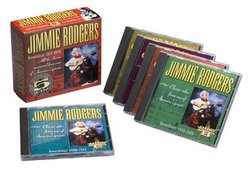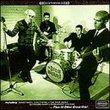| All Artists: Jimmie Rodgers Title: Recordings 1927-1933 Members Wishing: 1 Total Copies: 0 Label: Jsp Records Original Release Date: 1/1/2027 Re-Release Date: 10/15/2002 Genres: Country, Folk, Pop Styles: Classic Country, Traditional Folk Number of Discs: 5 SwapaCD Credits: 5 UPC: 788065770426 |
Search - Jimmie Rodgers :: Recordings 1927-1933
 | Jimmie Rodgers Recordings 1927-1933 Genres: Country, Folk, Pop
|
Larger Image |
CD DetailsSimilar CDs
|
CD ReviewsAlmost complete - at a bargain price. Peter Durward Harris | Leicester England | 10/20/2002 (5 out of 5 stars) "There have been three Jimmie Rodgers - a blues singer, a country singer and a pop/folk singer - the country singer is the subject of this compilation. This Jimmie Rodgers became the first legend of country music. Jimmie only recorded 111 songs, although altenative versions exist of some of them. Diehard fans who want absolutely everything can find it on the Bear Family boxed set. I love Bear Family's boxed sets - I have quite a few myself - but this box is much better value for money and contains more than enough of Jimmie's music to satisfy most people. So what's missing? All the alternate versions and just one other song - My time ain't long. I don't know why they left out this particular song, but it's not one that I was familiar with when I bought this collection. Anyway, I would have been content with a double-CD containing 40 or 50 tracks. A single CD could not accomodate all the tracks that I want. Jimmie's famous songs (all here) include In the jailhouse now, Daddy and home (superbly revived by Tanya Tucker in 1987 or so), Waiting for a train, Any old time, Mule skinner blues (listed as Blue yodel #8 - a cover of this song provided Dolly Parton with her first major solo country hit in 1970), Miss the Mississippi and you (brilliantly covered by Emmylou Harris and Crystal Gayle, among others), Peach picking time in Georgia and others too many to mention. Merle Haggard once recorded a whole album of Jimmie's songs and new covers of his songs are still recorded on a regular basis. In Jimmie's version of Frankie and Johnny, Frankie kills Johnny after discovering him being unfaithful and is sentenced to death in an electric chair. How different from Johnny Cash's version !!! I won't ever need another collection of Jimmie's music - this has everything I want and much more besides - and it's all wonderful. I later found the missing song, My time ain't long, when I wasn't even looking for it. I thought With My Little Ukulele in My Hand would be a great collection to have but I didn't buy it for the Jimmie Rodgers tracks, since I'd got everything of his that I wanted. I only realized that the hitherto elusive song was in that box after I took it home and started playing it, which was a real bonus. It's a good song but not essential. So now I have every song that Jimmie ever recorded although there are alternative versions of some of them that I don't have and don't need." Can't do without it, Not at this price Tony Thomas | SUNNY ISLES BEACH, FL USA | 05/27/2004 (5 out of 5 stars) "Jimmy Rogers is just soooooo good. It wouldn't matter if he was a high school kid recording in Glendale California, the stuff is just good to listen to not matter what kind of music you like. Rogers is just so great to listen to. Cool, humorous, sentimental, sexy, bold. He really has great time whether on guitar or voice, and the musicians he selected all work every well with him, despite some comments on the liners here that would indicate otherwise. Of course, the crowning heights are reached when Rogers records in Los Angeles with Lil Hardin Armstrong backing him on Piano and Louis Armstrong himself playing trumpet.When these records were made, Rogers has been a professional performer in vaudeville shows and local shows and barrooms for most of his short life. Despite the image he projected as the "singing brakeman" Jimmy never lasted long on regular jobs on the railraod even before his health gave out. He wanted to sing, and play guitar, ukelelle, and mandolin and hear other people do the same. He would find his way to circuses, carnivals, and tent shows even when he should have been in high school. We are all lucky that long time stars Jimmy Rogers and the Carter Family were discovered and recorded (actually for the first time at the same session) by Ralph Peer of RCA. Peer received no payment for finding and recording artists. He only received money for publishing rights to songs that his artists recorded. We know that Rogers, the Carters, and other artists that Peer discovered actually played may of the Tin Pan Alley pop songs of the day in their performances before and after being recorded. However, Peer demanded that each artist record only songs he could publish, songs they either claimed to have written or were traditional songs, or, at least, songs that were so old that whoever owned their publishing or copyrights might have disappeared into the mists of time. This led Rogers to the blues, as original material. This led him to do his own versions of many traditional songs which in themselves became classics. He also collaborated with Else McWilliams, an aunt who had degrees in both music and English, to write a number of sentimental songs (perhaps Ms. McWilliam's influece is responsible for the extreme correct grammar on many of the none blues songs). It was also proven in a law suit or two that Rogers and Peer lost, that Rogers and Peer would also doctor up and copyright in their own names songs fans had sent to Rogers hoping he would record them. This is great entertainment straddling the boundaries of Western music, the blues, and Jazz. Except on a couple tunes where the Carter Family joins Rogers, this has very little to do with Southeastern based old time country music. The only banjos on this record are tenor banjos used at the time in Jazz orchestras. The violins don't fiddle very much, but follow the conventions for the then prevelant jazz-pop violins. Armstrong is not the only jazz horn player on these recordings either. Contrary to the attempts to racially stratify people, Rogers was extremely popular with African Americans, particularly inthe South. Bluesmen like Robert Johnson had a repertoire of Roger's blues and non blues tunes because they would be asked for by his patrons in the Mississipi juke joints and Black dances. Later in the 1960s when Mississippi bluesmen Skip James and John Hurt was "found" and brought to national and international folk festivals, they would sit around between sets playing Jimmie Rogers songs together.! So good, and occupying such an important place in creating e blues, old time music, jazzz, Western Swing, and the WSM styled Country music, you really need this set if you have the unbelievably small price. The only qualification is that you have ears." The inimitable Jimmie Rodgers Joseph H Pierre | Salem, OR USA | 06/18/2004 (5 out of 5 stars) "
There's something about Jimmie Rodgers. Actually, there were three singers by that name as Peter Harris pointed out in his review (below). But, this one was the first. Jimmie, the "singing brakeman," was a blues singer, yodeler, and guitar player. He did all three well, but there have been better yodelers, better singers, and better guitar players. So, why do I love Jimmie Rodgers' music. When I first heard his songs, we had just moved into an old farmhouse, in the late 'thirties, and I found there a discarded Jimmie Rodgers record, Blue yodel Opus #3 and Opus #5 on the other side. They were the old shellac records, in 78 RPM. (That's all there were in those days). I liked them, learned the music and lyrics, and was introduced to Jimmie's style. He'd died of TB a few years earlier.He played the guitar like my father, from whom I learned. My attempts at yodeling were dismal, but they were good blues songs. I still like to sing them, and still can't yodel.I've collected Jimmie Rodgers songs since, but only had about 15 sides. I heard about this boxed set from Peter Harris, and was delighted when I discovered that it contains almost all of his songs, and the recordings are of high quality--digitally remastered, I'm quite sure. I think there are 109 songs in the set. I had no idea that he had recorded so many.I will have to say this: Jimmie Rodgers is perhaps the first Western music recording star (actually, his forte was country blues with guitar accompaniment, and especially railroad songs.) He will not please everyone; no musician does. His music appeals mainly to people like me, I suppose, who came from the Great Depression era, when we entertained ourselves, often with ukeleles made from cigar boxes, gut buckets, fiddles and guitars. We provided our own music. A time before rock 'n' roll, heavy metal and rap. Even jive. But, if you'd like to hear some old time music, listen to Jimmie. We thought he was great. He started it all.Joseph (Joe) Pierre author of Handguns and Freedom...their care and maintenance and other books" |

 Track Listings (23) - Disc #1
Track Listings (23) - Disc #1


